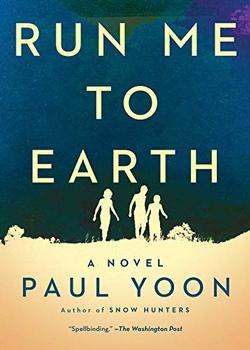Summary | Excerpt | Reading Guide | Reviews | Beyond the Book | Readalikes | Genres & Themes | Author Bio

Chapter 1
At the farmhouse, the three friends asked each other where they went to at nights.
They had finished most of their duties for the day and were sitting down on the floor together in the corner of the long room that had, two decades ago, held dances and lavish parties but had now been converted into a ward.
"A ship," Prany said. "I go to a very large ship."
"Someplace where there is a working fireplace," Prany's younger sister, Noi, said, leaning back against the wall. "A very large fireplace." Noi had been disappointed to learn that all the fireplaces in this house had been found sealed up when the doctors first arrived.
Above them there was a gap in the ceiling where they could see two stars and the passing clouds. In front of them, at the end of the rows of cots, a woman tried to turn in her sleep, forgetting that her legs and her torso had been eaten alive when she stepped on an unexploded cluster bomb three days ago. Then the woman remembered what happened but she avoided looking down, watching instead the moonlight coming in through the tall windows that lined the far wall.
They kept the curtains open because those who couldn't sleep wanted to look outside at what was left of the distant valley. It was called the Plain of Jars because of the strange stones scattered across this part of the country as though a mountain had fallen from the sky and shattered.
As far back as they could recall, Alisak, Prany, and Noi had heard so many stories of the megalithic stone jars they weren't sure which one was true: whether they were intended to collect rainwater for travelers, whether they were used to make wine for warriors who would return from great battles. It was also said that the jars once belonged to giants who roamed these hills. And others thought the jars had nothing to do with this earth at all and that in some future time someone or something would come back for them.
When the first bombs dropped, Alisak, who had been working on a farm that morning, was so stunned by the sound he was unable to move even as the horizon dispersed into a wall of smoke. His first thought: They've come for the jars.
These days he laughed at that. That old life. From the gap in the ceiling came the faraway engines of airplanes, and he waited for the detonations of the cluster bombs somewhere west or north of them. There had been so many bombings—it was getting more frequent, he lost count of how many a day—he almost didn't notice the sound anymore.
A birdcall, which he never heard anymore, would be stranger.
The sky flashed and flashed. Eventually, Alisak knew, maybe next week or in a month, the bombers would come back around toward the house. Not for them, but again for the roads and the valleys.
Yesterday, Prany packed bags for them, hidden now under a loose floorboard in a bedroom upstairs. He managed to stash one of the house pistols, too.
"Alisak," Prany said, leaning across, clutching a pillow, and poking him. "You didn't answer."
Alisak forgot they were playing the game. He was worrying a blister on his palm from the handlebars of the motorcycle he had been riding all day. The blister had burst and the flap of skin had turned almost as pale as the moonlight catching their boots.
"The desert," Alisak said. "I go to the desert."
Noi tipped her head back. She thought this was hilarious. She stayed that way, laughing quietly, her mouth open like a fledgling bird that was about to catch something from above.
"In the next life," she said, "our friend will be a Bedouin."
"What's a Bedouin?" Prany said.
Noi hit her brother on the head and then the two curled themselves around the frayed, embroidered pillows they had found upstairs on a bench beside an out-of-tune piano. A sheet of Bach was still on the piano's stand, the pages yellowed, but the bars and the notes were clear and dark.
Excerpted from Run Me to Earth by Paul Yoon. Copyright © 2020 by Paul Yoon. Excerpted by permission of Simon & Schuster. All rights reserved. No part of this excerpt may be reproduced or reprinted without permission in writing from the publisher.
No pleasure is worth giving up for the sake of two more years in a geriatric home.
Click Here to find out who said this, as well as discovering other famous literary quotes!
Your guide toexceptional books
BookBrowse seeks out and recommends the best in contemporary fiction and nonfiction—books that not only engage and entertain but also deepen our understanding of ourselves and the world around us.